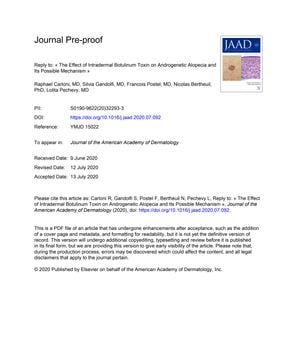TLDR Botulinum toxin may help treat hair loss by relaxing scalp muscles, improving oxygen and blood flow.
This document is a reply to a letter discussing the use of botulinum toxin in treating androgenetic alopecia (AGA). The authors of the reply discuss their own systematic review of the existing data on the use of botulinum toxin in alopecia, which found that the main mechanism of action reported by authors in AGA was a relaxation of the muscles of the scalp, allowing for better oxygenation of tissues and increased vascular flow. The authors also discuss the need for higher doses of botulinum toxin to obtain efficacy and the importance of long-term studies to determine the lasting effects of treatment. Overall, the authors congratulate the original authors on their new axis of research and hope it will lead to robust conclusions on the use of botulinum toxin in AGA.
 13 citations
,
May 2020 in “Journal of Plastic Reconstructive and Aesthetic Surgery”
13 citations
,
May 2020 in “Journal of Plastic Reconstructive and Aesthetic Surgery” Botulinum toxin's effectiveness for treating scalp alopecia is not well-supported due to insufficient data.
 15 citations
,
April 2020 in “Journal of The American Academy of Dermatology”
15 citations
,
April 2020 in “Journal of The American Academy of Dermatology” Botulinum toxin injections may help treat hair loss by blocking harmful secretion in hair follicles.
 12 citations
,
December 2018 in “Dermatologic Therapy”
12 citations
,
December 2018 in “Dermatologic Therapy” Small Botox dose effectively treats hair loss in Chinese men.
 24 citations
,
January 2017 in “Journal of Cutaneous and Aesthetic Surgery”
24 citations
,
January 2017 in “Journal of Cutaneous and Aesthetic Surgery” Botulinum toxin was found to be a safe and effective treatment for male pattern baldness in a small test, but more research is needed.
 50 citations
,
November 2010 in “Plastic and Reconstructive Surgery”
50 citations
,
November 2010 in “Plastic and Reconstructive Surgery” Botox increased hair count in men with baldness and might work by improving scalp blood flow.
 June 2024 in “Dermatology and therapy”
June 2024 in “Dermatology and therapy” Intramuscular injections improved hair density more than intradermal injections for treating hair loss.
 August 2025 in “Drug Design Development and Therapy”
August 2025 in “Drug Design Development and Therapy” Current treatments for androgenetic alopecia are complex and promising, but more research is needed.
 August 2023 in “Journal of Cosmetic Dermatology”
August 2023 in “Journal of Cosmetic Dermatology” Higher concentration of botulinum toxin A is safe and effective for treating hair loss in men and women.
September 2025 in “Chinese Journal of Plastic and Reconstructive Surgery” Botulinum toxin may help treat hair loss but needs more research for effectiveness and cost concerns.
Botulinum toxin shows promise for treating scalp sweating but not for hair growth.








